Introduction: In this article, Gena Philibert-Ortega searches old newspapers to learn more about the tradition of making predictions for the upcoming New Year. Gena is a genealogist and author of the book “From the Family Kitchen.”
Can you believe that it’s time to close the books on 2016 and welcome 2017? Do you have anything special you do to ring in the New Year? What are your New Year’s traditions? Do you go out to a party? Cook a special meal?
Does your family make predictions for the coming year? Some families spend time on New Year’s Eve making personal predictions to be revisited at the end of that year. Not surprisingly, newspapers also publish New Year predictions, both serious and humorous, at the start of the year.
The history of prediction-making is probably as old as time itself. One of the more famous predictors is the 16th century French seer Nostradamus. Predictions often combine knowledge of the past, trends, and wishful thinking.
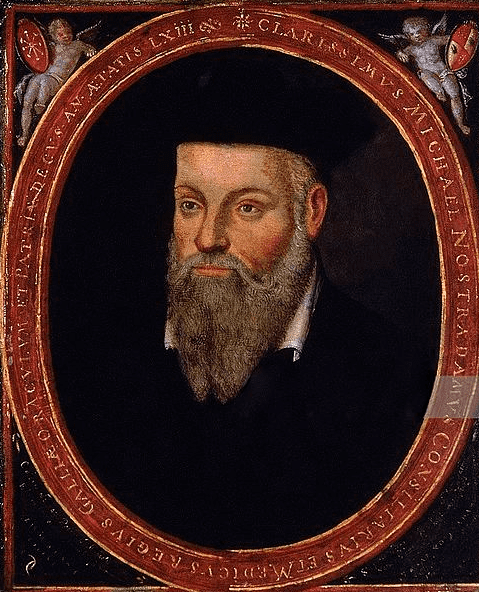
Predictions of the Famous
Predicting the course of a year isn’t just something that psychics engage in. Everyone has tried their hand at it, whether just talking off the cuff to a friend or responding to newspaper reporters. Reporters have for a long time sought out the opinions of the movers and shakers in society to get their take on the future.
The inventor Thomas A. Edison was no stranger to predictions. He told Scientific American in 1901 that he believed a mixture of cement and steel will be the preferred method of construction in the future.* (This shouldn’t be too surprising since he founded a cement company a few years earlier and went on to building homes out of concrete.)
In this 1915 newspaper article, Edison provides more predictions. These predictions, made during World War I but before the United States entrance into the conflict, reflect his thoughts about the future – including that the war would end in two years with Germany’s loss (World War I ended on 11 November 1918). His last prediction was more of a wish, or perhaps a request, when he stated that “American business men will stop bemoaning the war and ‘get busy.’”
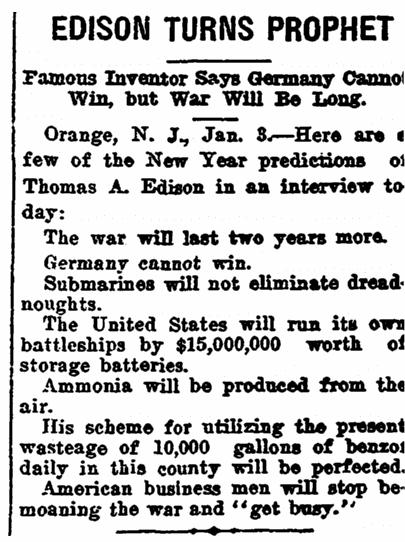
Another prediction having to do with war, this time World War II, came from various world leaders in 1944 and their response to the ongoing conflict and hope for peace. The first prediction by Prime Minister Winston Churchill says that the year 1945 “should bring us victory in Europe,” and added: “Before many months have passed the evil gang that has long dominated that unhappy continent will be wiped out.” Five months later, on 8 May 1945, the Allies were celebrating Victory in Europe Day – and, later that year, the end of the war.
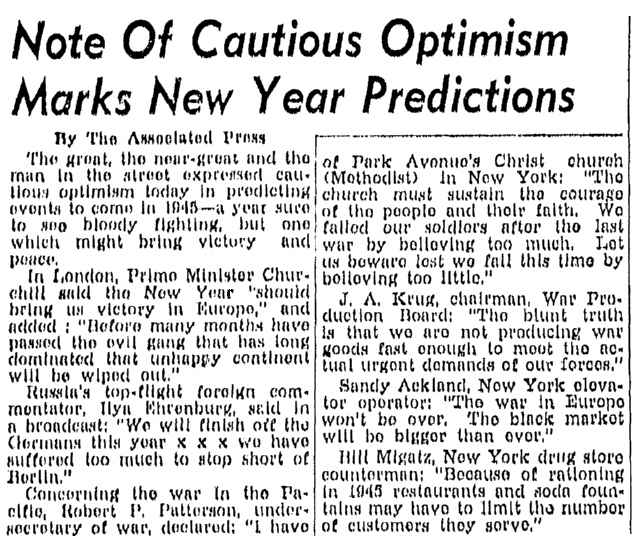
Astrological Predictions
The one group we expect to see predictions from is astrologers or psychics. In this 1985 newspaper article about Jeane Dixon, a well-known American psychic who had a syndicated newspaper column, predictions cover celebrities and world leaders. At least two of her predictions would not come to pass – namely, the assassination attempts on Pope John Paul II and President Ronald Reagan. Both men were the targets of previous assassination attempts, but no attempt was made on their lives in 1985.
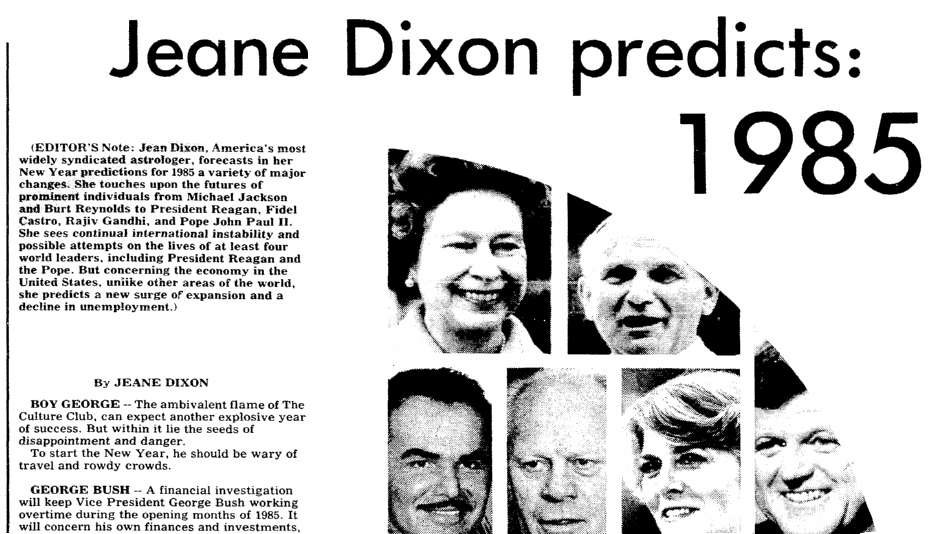
Dixon isn’t the only psychic whose predictions were printed in the newspaper. Achille d’Angelo, the “Seer of Naples,” made a few predictions for 1956 – including that there would be a grave crisis in the Kremlin, and a change in the White House. He also predicted that no one would reach the moon or Mars.
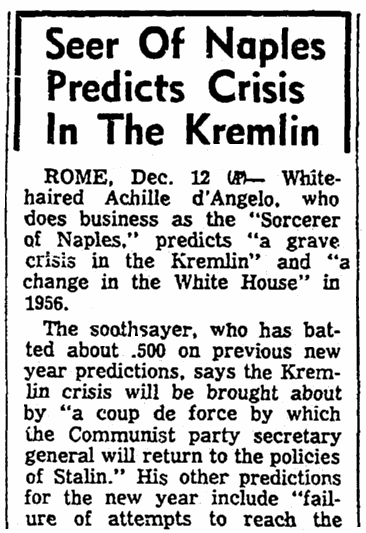
Accuracy Is All a Matter of Time
Some yearly predictions are more tongue-in-check. And as you can predict, the only 100% foolproof prediction is one made after the event. This prediction method is a favorite of the Procrastinators Club of America. In this December 1990 newspaper article, the group explains their history and their 1990 predictions. This group is probably one of the easiest to join since the organizers admit that most people put off mailing their membership application and dues. Their predictions include that presidential dog Millie’s book would outsell a biography of its owner, and that musical group Milli Vanilli would lose their Grammy due to lip-synching.
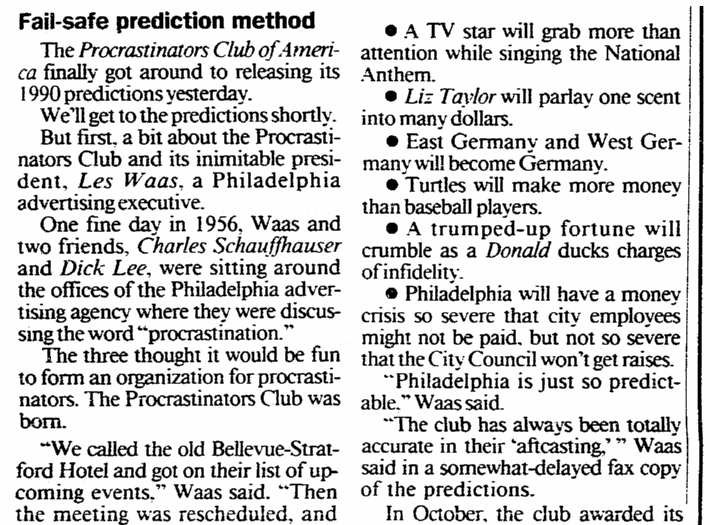
Now It’s Your Turn
So, what are your predictions for 2017? My predictions are simple: 2017 will seem to go by way too fast, and in December 2017 we will wonder where the year went. More historical newspapers will be made available from GenealogyBank, which means I’ll spend a lot of time reading through them looking for my ancestors and interesting stories. What about you?
Happy New Year!
—————————–
* “The Future: A History of Prediction from the Archives of Scientific American,” Scientific American (https://www.scientificamerican.com/article/50-100-the-future-history-prediction-from-archives-scientific-american/: accessed 23 December 2016)

I appreciate the info you shared on this article, especially the newspaper clipping. Thank you!
Newspapers always have such great information about the past, don’t they? Thanks for taking the time to read the article, Grace. I appreciate it!